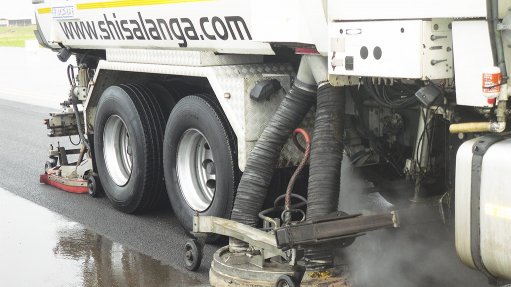
A strong belief that a competitive edge must come from innovation has seen Southern African asphalt supplier National Asphalt invest in research and development to the advantage of the African construction, building, infrastructure and mining industries.
National Asphalt has made broad strides in pioneering a number of innovations, and its strategic investment in Shishalanga Construction last year saw the addition of hydrocutting technology to its road surfacing solutions.
Hydrocutting, sometimes known as hydro texturising, is a cost-effective and environmentally sound solution for repairing and restoring flushed bituminous pavements. Using high-pressure water blasting, the hydrocutter removes flushed seals including bitumen, asphalt and concrete, restoring the texture and friction of a pavement without reducing the structural life of the surface.
The removal of excess bitumen and rubber increases skid resistance with the improved porosity of the asphalt, reducing the risk of aquaplaning, limiting the road spray generated by vehicles by as much as 90% and reducing the road noise factor by 50%, all of which improve general road safety. The life of the road surface is extended because once the bitumen is removed, the stone chip matrix remains in place.
In terms of multiple seal layers, seal stability is dramatically improved with a reduction in the overall bitumen-content ratio by up to one litre per square metre per single treatment and a substantial improvement of the micro and macro texture of the seal.
The hydrocutter comprises a truck-mounted high-pressure water pump and vacuum recovery system and offers the flexibility to treat widths from 0.75 m to 3.45 m. The high-velocity vacuum system allows for the cutting pressure as well as the texture depth to be determined while the machine is in operation. Another significant advantage is that the hydrocutter can capture and secure all spillages and waste material for disposal at designated waste sites. The unit has a 5 000 ℓ or 10 m3 wastewater storage capacity.
The hydrocutter process can also be used to clean open-graded asphalt that has been clogged by debris. By simply changing the spray bar nozzles, cutting speed and pressure to create a ‘washing’ action, the hydrocutter will revitalise the asphalt by removing all detritus.
Another area in which National Asphalt has made significant advances is Reclaimed Asphalt (RA) technology, which is being increasingly specified as its use significantly reduces the volume of virgin new aggregate required. While there are numerous benefits, the primary one is the ability to recycle an existing pavement layer comprising a mix with an inherently good aggregate and a certain proportion of bitumen.
National Asphalt has also developed a dual-purpose environmentally friendly additive manufactured from renewable raw materials. EcoNat can be used in the manufacture of warm, low-temperature and cold asphalt mixes. In addition, its use as a powerful asphaltene dispersant means it is ideal for the manufacture of RA mixes, where it rejuvenates the properties of age-hardened bitumen.
The successful completion of a number of key RA projects for the South African Roads Agency (Sanral) has established National Asphalt as the clear leader in this technology.
Further testament to its innovative approach, National Asphalt was one of the pioneers in the introduction and development of a high modulus asphalt (HiMA) in South Africa. Reference is now made to French EME, where harder penetration-grade bitumen is used. This product is recycle-friendly and is proven as a viable alternative to concrete base pavements. The low penetration binders used in EME are now covered in the European Union standards as a separate category and potentially compete with modified binders on performance and cost.